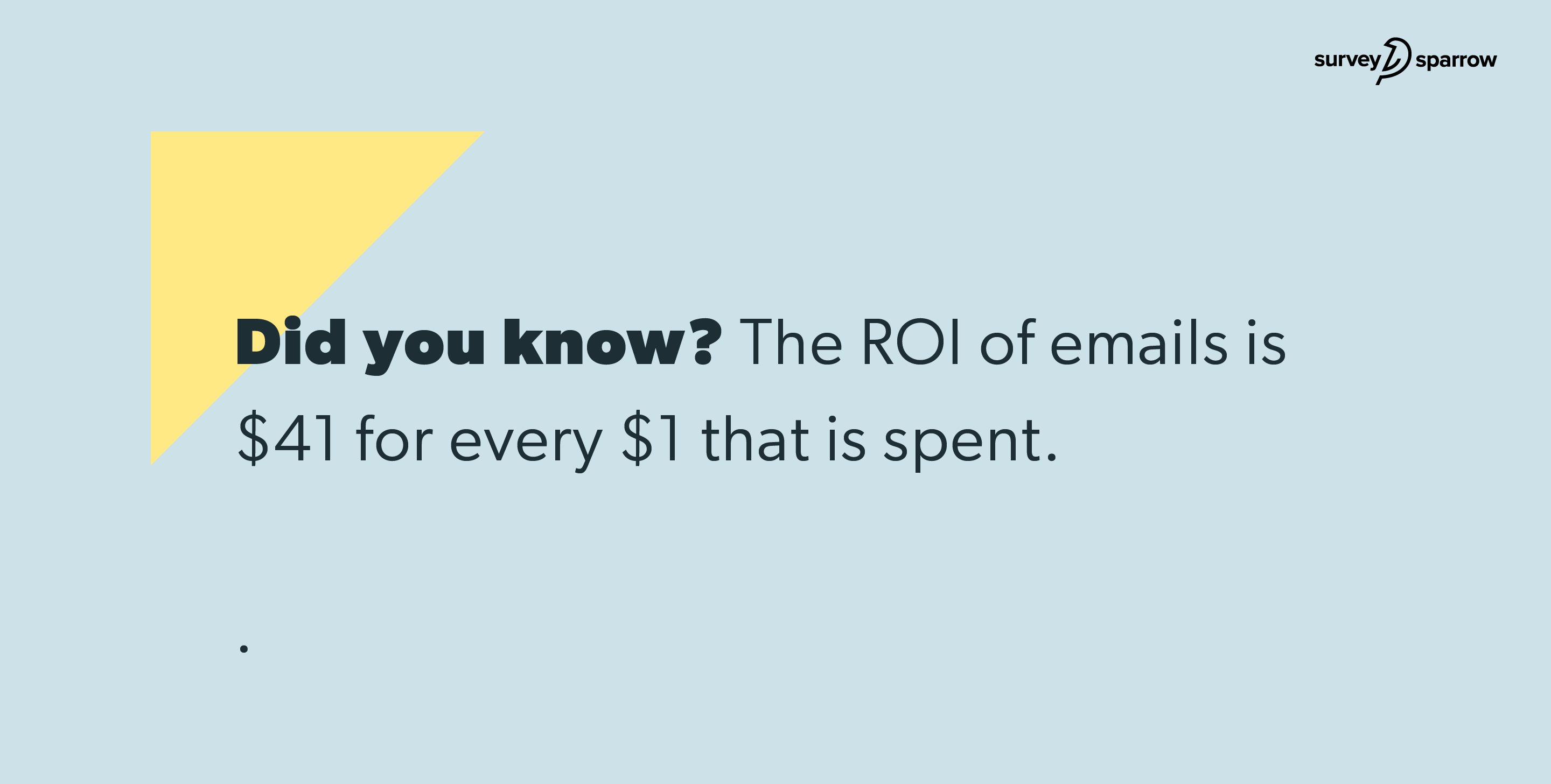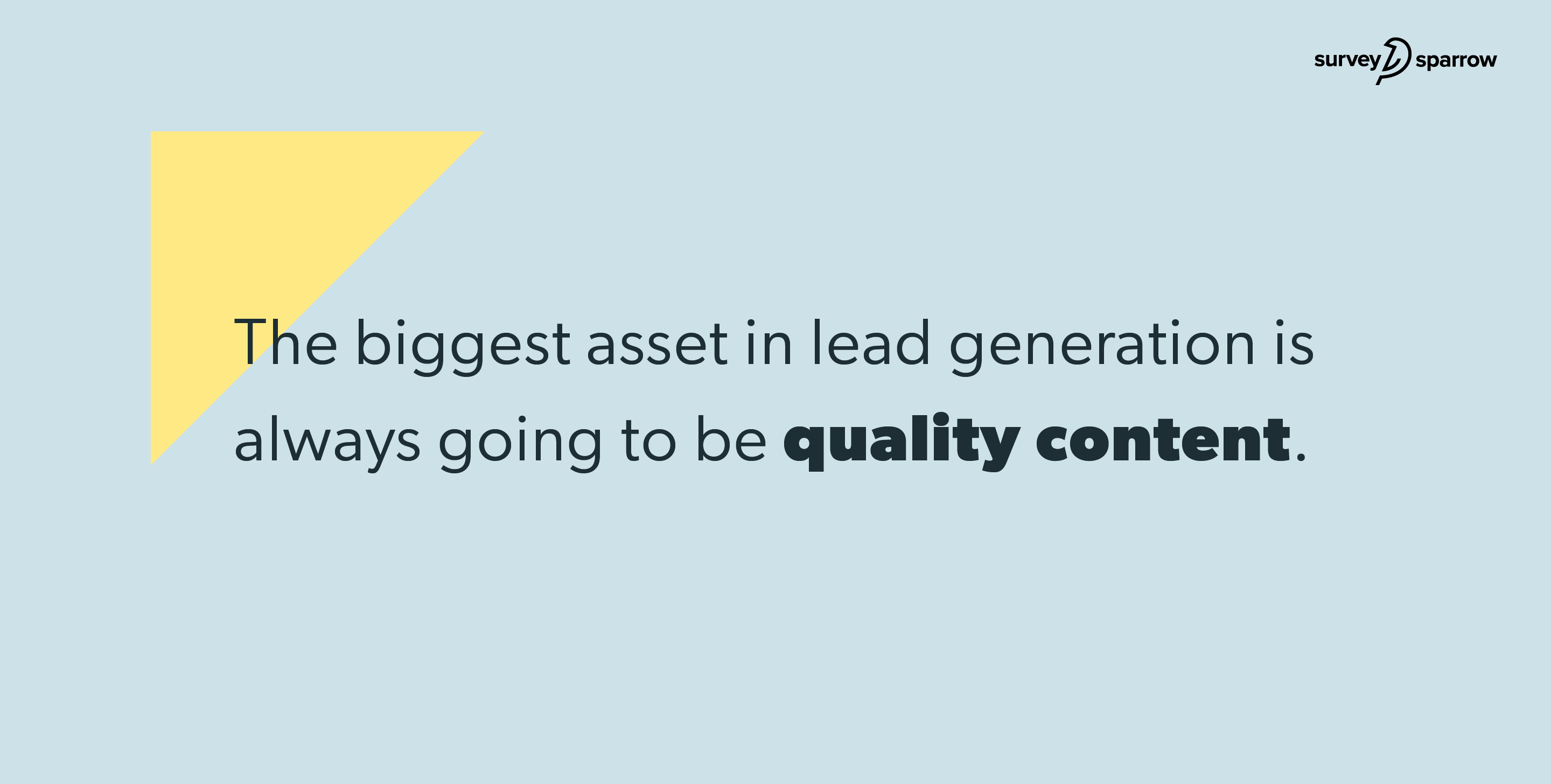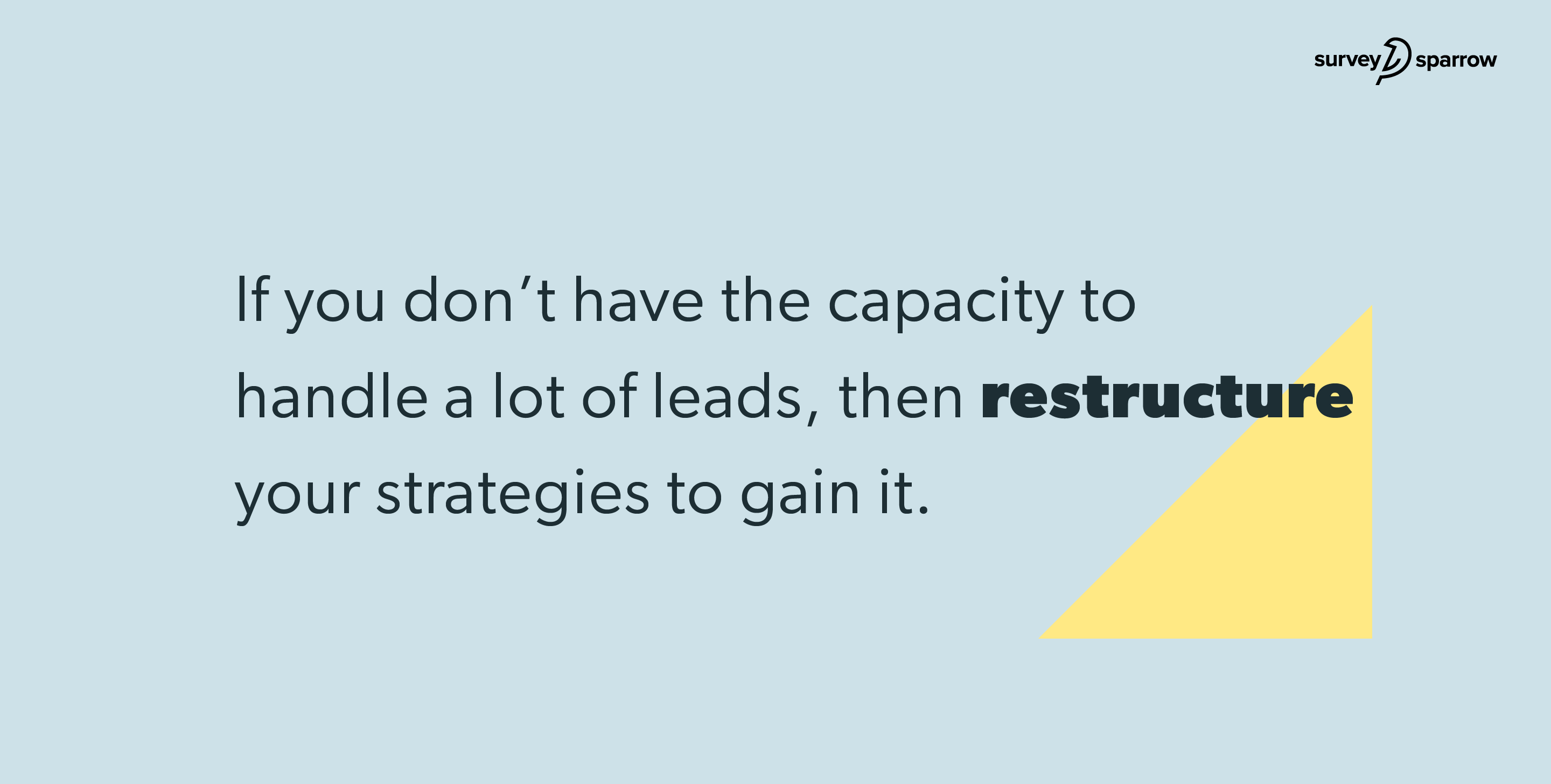Best Of
10 Lead Generation Strategies That Are Super-Effective
Article written by Mathew Maniyamkott
Regular contributor to various magazines. Passionate about entrepreneurship, startups, marketing, and productivity.
14 min read
18 June 2025

Having a perennial flow of leads is the holy grail for any business. While cold calling is the numero uno sales technique for lead generation, it might not always work for all companies. So, what other effective lead generation strategies can you use?
This article will discuss ten lead-generation strategies that work perfectly well for any business, regardless of size or stage.
What is a Lead Generation Strategy?
Lead generation strategies are a way for businesses to attract potential customers. It involves different methods, such as using social media, creating exciting content, or offering something valuable to grab their attention.
The idea is to get their contact information, like an Email ID or a phone number. This is so the company can stay in touch to show what more is in store. This involves delivering tailored content, promotions, or special offers to nurture leads and guide them through the customer journey.
The ultimate goal? Turning these interested folks into actual customers.
Lead Generation Strategies: Best Practices to Follow
Now, creating effective lead generation strategies involves a combination of thoughtful planning and continuous refinement. Have you ever seen a movie without a script? Chaos, right?
Here are some best practices to follow:
- Know Your Crowd: What makes them tick? Get the lowdown on your ideal customers. Know their needs, challenges, and preferences. Customer feedback is key! Maybe use an advanced tool such as SurveySparrow. It just streamlines the entire data collection process!
- Create Killer Content: Create content that is not just good but downright awesome! Blogs, videos, webinars – whatever floats their boat.
- Optimize Your Website: Your website must be user-friendly. Moreover, it must be optimized for conversions. So, have clear calls-to-action, easy navigation, and compelling landing pages.
- Mix It Up on Socials: Don’t put all your eggs in one basket. Hit up different channels like social media, emails, and content, and even throw in some paid ads.
- Most importantly… Team Up Sales and Marketing: Teamwork makes the dream work. Make sure your sales and marketing teams are in sync. It’s like having the ultimate tag team for lead-generation success.
Before we delve into the strategies, let’s find the answer to one question (that, I’m sure, is) lurking in your mind.
What are the Three Approaches to Lead Generation?
Regarding lead generation strategies, approaches based on content, cost, and credibility are fundamental. Let’s break them down, shall we?
1. Content-Centric Approach
- Focus: Attracting leads through valuable and relevant content.
How It Works:
- Create compelling content such as blog posts, articles, videos, webinars, or downloadable resources.
- Distribute content through various channels, including your website, social media, and email.
- Content is a magnet, drawing in potential leads interested in your information or solutions.
Pros:
- Positions your business as an authority in the industry.
- Attracts leads genuinely interested in your offerings.
Cons:
- Requires consistent content creation and distribution efforts.
2. Cost-Efficient Approach
- Focus: Generating leads with a mindful approach to budget constraints.
How It Works:
- Utilize low-cost or free channels such as social media, organic search, and email marketing.
- Implement targeted advertising campaigns with careful budget management.
- Leverage cost-effective content creation strategies, like user-generated content or repurposing existing materials.
Pros:
- Maximizes ROI with efficient use of resources.
- Suitable for businesses with limited marketing budgets.
Cons:
- It may require more time and effort to yield significant results.
3. Credibility-Centric Approach:
- Focus: Establishing trust and credibility to attract and retain leads.
How It Works:
- Showcase customer testimonials, case studies, and success stories to build trust.
- Invest in high-quality content that reflects your expertise and commitment to solving customer problems.
- Engage in thought leadership activities to position your business as an industry authority.
Pros:
- Builds trust and loyalty among potential leads.
- Attracts leads who prioritize credibility in their decision-making process.
Cons:
- Requires consistent efforts to maintain and enhance credibility over time.
10 Effective Lead Generation Strategies to Shape Your Business
Whether it is B2B lead generation or B2C, some common strategies can enhance and improve the conversion rate. It is essential to understand the process behind effective lead generation. Everything boils down to marketing yourself to enhance visibility.
So, here are some effective lead generation strategies:
1. Webinars
Webinars are a popular technique because you can connect with people worldwide (which is not the case with a seminar). So, how can you use them to stand out from the crowd?
- Rope in the subject matter experts. Remember, your audience has high expectations. A good webinar will establish you as a credible source of information.
- Take every opportunity to interact with your audience. Webinars allow you to do this with ease, unlike videos or ebooks.
- Solicit and answer questions. It allows better customer understanding, product understanding, and objection handling.
- Get contact information. People who connect with you on a webinar are usually the decision-makers. They have more knowledge on the subject, are looking for more information, and hope to make a meaningful connection. So they are willing to share their information.
- Partner and collaborate with other brands. That can also be a source of revenue if they are interested in sponsorship.

2. Email Marketing
Which of us hasn’t panicked about losing our phone? Our smartphones have become an indispensable part of our day. Consequently, so has email. Emails are less intrusive for customers than phone calls and are an expected part of business communication. That’s why email marketing will always be one of the most effective ways to market your business – and a solid lead generation strategy too.
Here’s how you can get the best out of it.
- Divide your email subscribers into segments based on demographic and firmographic characteristics. It helps you send email campaigns relevant to a particular segment – which is 18 times more effective than mass email blasts.
- Speed up the process with cold emailing. You can use email marketing software to automate the process – from mail contact sourcing to email templates to automatic follow-ups.
- Nurture leads over time with email drip campaigns.
- Assign lead scores using email marketing automation. Lead scoring is the process of assigning scores to leads based on their actions. With the lead score, you can decide what action to take next, what information to send, and its frequency.

3. Search Engine Optimization
Love or hate SEO, it is a vital tool if you want to increase your website visibility. And this, in turn, will impact leads. Therefore, any activity to increase the visibility on the search engine results page comes under search engine optimization. Yes, whether it is link-building or social media marketing. Here are the time-tested ways to generate leads from SEO.
- Optimize your website with keywords. Use keywords with lower search volumes, as the higher ones will have a lot of competition from established brands with big budgets.
- Competitor study is something that you should never ignore. Study the backlinks used, the kind of tools they use, their strategies, etc. Again, you can use tools like SEMRush to understand this.
- Make your website responsive. Remember that people search for things on the move. So ensure your website is easy to use, fast, and sleek in design and usability.
- Create content consistently. Use headings and subheadings for your readers to improve their user experience. That will help them scan the content. Content may be king, but content formatting is queen.
- Write guest posts or subscribe to contextual link-building services. They will build credibility for your website. Link-building services, guest post placements, in particular, build your website’s authority in search engines, making all your blog posts more visible in web searches.
- Use alt tags for your images. It is not just for accessibility. To understand the image’s subject, Google uses alt-tag text, vision algorithms, and the page’s contents.
- Be active on social media. Not all channels are necessary; use the ones where most of your customers lurk. Social media is a popular channel for questions and complaints – each is an opportunity to ramp up business.
4. Content Marketing
The content is the king, queen, and the whole army combined. There is nothing to market without content, so it is the most potent missile in your lead generation arsenal. Therefore, you should fill each section of the customer journey with different types of content related to your business.
- Find out what kinds of customers are looking for your product. Look at the existing content. Then, understand what type of content those customers want.
- Find the keywords linked to your customers’ needs.
- Create content that is in line with the first two steps.
- Produce ebooks. While they sound boring, ebooks are a source of immense value to your customers. It should have a unique angle, benefit your target audience, and educate potential leads about your business. You can choose to have a sign-up form at the start to unlock the complete ebook or keep a CTA at the end to capture details.
- Create white papers and guides. It will tell your audience about the kind of knowledge you have about the industry.
- Write case studies. Use good storytelling that showcases the success achieved by your clients when using your product.
- In the case of your B2B audience, develop and distribute valuable and relevant content that addresses their pain points and challenges.
5. Social Media Marketing
Over the years, social media marketing has matured as a strategy that even B2B businesses can use effectively. Here’s how to use one of the best lead generation strategies.
- LinkedIn advertising. While LinkedIn ads are expensive, they offer immense organic reach and are cheaper than FB ads. As Gary Vaynerchuk said, “LinkedIn 2020 is like Facebook 2012.” More importantly, it connects you directly to decision-makers – which no other social media offers.
- Promote your content on Twitter. Be active on Twitter. People use Twitter to keep themselves informed about things that matter to them. Use this to craft content for someone interested in your business/industry.
- Facebook has robust targeting options and is still one of the most powerful social media platforms. Its targeting is one of the reasons why it is popular with both B2B and B2C marketers alike.
- Build your community on any of the social media platforms. For example, it could be a group with potential leads interested in your industry.

6. Conversion Rate Optimization
No matter how much traffic your campaigns generate, if there are few leads to show, it is not the kind of success you are hoping for. So here is where conversion rate optimization kicks in. Conversion rate optimization means converting online visitors into leads, which are the strategies you should follow.
- Optimize web forms: Optimize web forms: Online forms are essential for capturing contacts online. Email sign-ups, lead box, free content downloads – all forms. But how many forms do you want to fill them? So, create visually appealing forms or interactive tools like a spin the wheel widget that are easy to build, test, and share on any page without writing a single piece of code for easy lead conversion and distribution.
- Exit-intent popups: When a user reads your post on a particular topic, the next step is to give them a reason to stay on your page. You can trigger exit-intent popups to give them a reason to stay, like a promotion or a free download.
- As Mad-Eye Moody says, “Constant vigilance!” Test the elements on your website. Test different variations of your page. Then, find out which ones get the highest response.
7. Conferences/Seminars/Trade shows
In a shrinking world, one thing hasn’t changed: the power of human interactions. Virtually or offline, conferences, seminars, and trade shows are indispensable to building contacts.
- Hundreds of conferences happen every year, even in your industry. So attending the most relevant ones to your business is advisable.
- Conferences can be expensive. So, prioritize the events that give you the most value for your ticket.
- Research the kind of audience that will be attending. For example, is it a mix of industries, industry-specific or product-specific?
- Try to see if you can get a speaking opportunity for your CEO. A speaker’s tag carries a lot of weight and, by association, the speaker’s business. It also paves the way for better networking after the event.
- Get access to the list of attendees. It helps you study your audience in advance and have clear strategies when talking to them during the time allotted for networking.
8. Affiliate Marketing
How does affiliate marketing work for B2B? In a B2B type of affiliate marketing, you build partnerships with other companies with an auxiliary or complementary product, bloggers, and influencers with an audience similar to yours.
Both parties can agree to a flat rate or a commission for each client that converts. Even a barter basis works. Barter is when you ask for a percentage discount on your affiliate’s products for your users and vice versa. It is a win-win for everyone.
Also, you can reach out to possible affiliates through Twitter, LinkedIn, Instagram, trade conferences, publications, trade magazines, etc.
Trust us; it is not that difficult to find influencers who will be interested in becoming partners. It is all about finding the right synergy and creating a partnership to bring in the leads.
9. Pay Per Click Advertising
PPC advertising is an excellent strategy if you want to get leads fast. One of the best things about the prospects you get from PPC ads is that these people are looking specifically for a product similar to yours.
If there is one tip we recommend, it is to avoid directing visitors who click on the PPC ad to the home page. Instead, refer them to a well-designed landing page that matches their search term.
Your homepage does spell out information about who you are, what you do, and the benefits associated with you – but it spells out too much information. Users who click on the ad are looking for a specific solution.
Include a lead generation form on your landing page so interested visitors can enter their details.
10. Personalized Content
Who wouldn’t say yes to something that feels like one made it for you?
Aside from that, it is one of the best ways to differentiate your brand, too. For example, suppose you’re considering this as a lead generation strategy. In that case, there are marketing analysis tools that make it super simple to find out what exactly your users want.
- The first step towards creating personalized content that converts is to find out who exactly your audience is.
- Next, create buyer personas so that you have a granular understanding of who your customer is.
- Separate your audience into different segments to know who will enjoy content A more than content B. This differentiation that you make will be the cornerstone of your sales efforts.
- When creating personalized content, ensure it aligns with your short-term and long-term goals. Do not deviate from business objectives.
- Track your efforts. Online survey tools like SurveySparrow give real-time insights, relevant data, and dynamic surveys to boost responses by 40%.

Explore Deeper Customer Insights with SurveySparrow
A personalized walkthrough by our experts. No strings attached!

Conclusion
While we have talked about just ten lead generation strategies, there are many more that you can use for your business! Once you are an expert at the above lead generation strategies, adopt more techniques to increase leads.
Consider investing in marketing automation once you get to the happy place where your team has more leads than they can handle. That will lighten the load considerably. Good luck!
Start 14 Days free trial

Mathew Maniyamkott
Guest Blogger at SurveySparrow
Related Articles

Compare
Teams vs Zoom: A Feature-by-Feature Look
11 MINUTES
16 October 2024

Customer Experience
10 Excellent Ways AI Will Improve Customer Experience in 2024
15 MINUTES
31 July 2023

Best Of
Best AI Chatbot Platforms: Build Powerful No-Code Chatbots
18 MINUTES
18 April 2019

Best Of
Start, Stop and Continue Framework: Unleashing its Importance
6 MINUTES
14 June 2023
